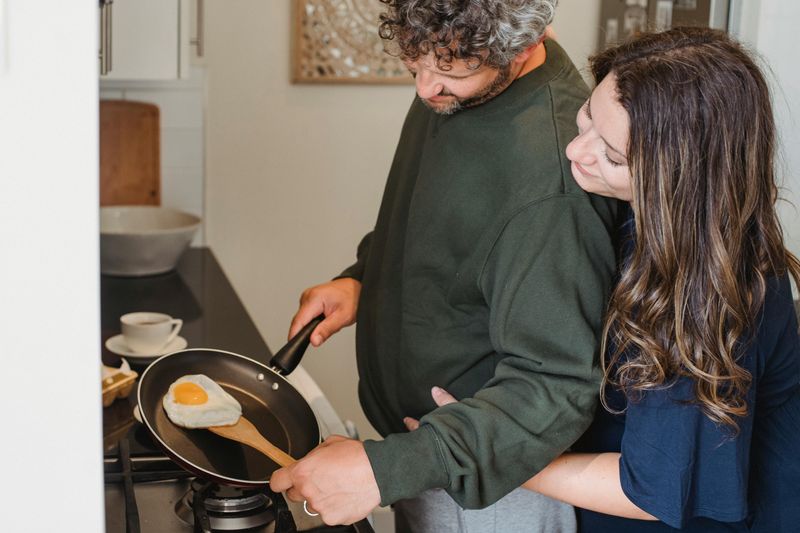Marriage thrives on trust, and communication is the bridge that builds it. When couples master certain ways of talking and listening, their bond grows stronger. The habits we form in daily conversations shape how safe we feel sharing our hearts with our partner. These 12 communication habits can transform your marriage into a place where trust blooms naturally.
1. Active Listening
Put down your phone, turn away from distractions, and truly focus when your spouse speaks. Making eye contact shows you value their words more than whatever else might be competing for your attention.
Many couples hear without listening, missing the feelings beneath the words. Active listening means nodding, reflecting back what you heard, and asking questions that show genuine interest.
When your partner feels thoroughly heard, they’ll share more openly next time. This creates a beautiful cycle where deeper conversations become possible because you’ve proven yourself trustworthy with the smaller ones.
2. Honest Expression
Speaking your truth kindly opens the door to genuine connection. When you share your actual feelings rather than what you think your partner wants to hear, you build a foundation of authenticity that strengthens over time.
Honesty doesn’t mean brutal bluntness. Wrapping difficult truths in compassion shows respect for your partner’s feelings while still maintaining integrity. The courage to be vulnerable about your needs, fears, and hopes invites your spouse to do the same.
Remember that white lies, even small ones, create tiny fractures in trust that can eventually weaken your entire relationship. Truth told with love is always the stronger choice.
3. Consistent Transparency
Marriage flourishes when nothing important remains hidden. Sharing your daily experiences, from minor frustrations to significant victories, creates a shared life story where your partner feels included rather than shut out.
Financial transparency particularly builds trust. Joint decisions about spending, saving, and financial goals prevent the betrayal that comes with money secrets. Being open about your whereabouts, friendships, and digital communications eliminates the breeding ground for suspicion.
This doesn’t mean sacrificing all privacy or independence. Rather, transparency means creating a relationship where nothing important needs hiding because you’ve built a safe space for accepting each other’s complete humanity.
4. Respectful Disagreement
Every marriage faces conflict, but how you disagree matters more than what you disagree about. Fighting fair means sticking to the current issue without dragging up past mistakes or attacking character.
Using “I feel” statements instead of accusatory “you always” language keeps conversations productive. Taking turns speaking without interruption shows you value your partner’s perspective even when it differs from yours. Maintaining a calm tone even when emotions run high demonstrates remarkable self-control that builds tremendous trust.
The goal isn’t winning arguments but understanding each other better. When both partners know disagreements won’t lead to name-calling or relationship-threatening behaviors, they feel safe expressing honest opinions.
5. Affirmation & Appreciation
Noticing what your partner does right changes everything. Specific compliments like “I appreciate how you always remember to call when you’ll be late” carry more weight than generic praise.
Gratitude expressed daily creates a positive atmosphere where trust thrives naturally. When your spouse knows their efforts are seen and valued, they feel motivated to continue investing in the relationship. Public affirmation in front of friends or family multiplies the impact, showing you’re proud to be their partner.
Even during difficult seasons, finding something to appreciate maintains connection. The habit of looking for the good in your spouse trains your mind to focus on their strengths rather than weaknesses.
6. Nonverbal Warmth
Your body speaks volumes before words ever leave your mouth. A warm smile when your spouse enters the room silently communicates “I’m happy to see you” in a way that builds security in your relationship.
Physical touch—holding hands during a difficult conversation, a reassuring shoulder squeeze, or a lingering hug—creates connection beyond words. Eye contact during conversations signals full presence, while nodding shows you’re tracking with their thoughts and feelings.
Even your posture matters. Turning toward your partner rather than away, uncrossing your arms, and leaning slightly forward all demonstrate openness and receptivity that encourages trust to grow between you.
7. Clear Boundaries
Healthy marriages thrive on mutual respect for personal limits. Clearly expressing your boundaries—whether about time alone, relationships with others, or personal values—prevents misunderstandings that erode trust.
“I need an hour to decompress after work before discussing household matters” provides your partner with clear expectations. When both spouses honor each other’s boundaries without taking them personally, security deepens. This practice acknowledges that even in marriage, you remain individuals with valid needs.
Revisiting and adjusting boundaries as life changes shows flexibility while maintaining self-respect. The courage to articulate your needs paired with respect for your partner’s limits creates a relationship where both people feel safe.
8. Accountability
Marriage becomes unshakable when both partners own their mistakes without defensiveness. Saying “I was wrong about that” or “I shouldn’t have spoken to you that way” demonstrates integrity that builds profound trust.
Quick apologies prevent small hurts from festering into major resentments. Specific acknowledgment of how your actions affected your spouse shows empathy that heals wounds faster than generic “sorry” statements. Following words with changed behavior proves your commitment to growth.
This willingness to be accountable creates safety. Your partner knows you won’t hide behind excuses or shift blame, making them more likely to approach difficult conversations with openness rather than fear of being gaslit or dismissed.
9. Encouragement & Support
Being your partner’s biggest cheerleader creates unbreakable bonds. Celebrating their successes as enthusiastically as your own shows genuine investment in their happiness and growth.
Support looks different in various seasons. Sometimes it means practical help during busy periods, while other times it’s emotional presence during struggles. Asking “How can I support you with this?” rather than assuming you know what they need demonstrates respect for their autonomy.
The confidence that comes from knowing someone believes in you, even when you doubt yourself, provides incredible security. When your marriage becomes a reliable source of encouragement, trust naturally flourishes because you’ve proven you want the best for each other.
10. Constructive Feedback
Growth-oriented marriages thrive on helpful feedback delivered with care. Timing matters—choosing a relaxed moment rather than the heat of frustration shows respect for your partner’s emotional wellbeing.
Sandwiching concerns between sincere appreciation helps difficult messages land more gently. “I love how organized you usually are, and I’m finding it hard to find things in the garage lately. Your system for the kitchen works so well—maybe we could apply something similar there?” The focus stays on specific behaviors rather than character flaws.
Equally important is openness to receiving feedback without defensiveness. This mutual exchange of helpful insights creates a marriage that continuously improves rather than stagnating in unaddressed problems.
11. Regular Check-ins
Intentional conversations about your relationship prevent small issues from becoming major problems. Setting aside distraction-free time weekly to ask “How are we doing?” creates space for honest reflection before tensions build.
These check-ins work best with structure. Questions like “What made you feel loved this week?” or “Is there anything I could do differently to support you better?” guide meaningful dialogue. Taking turns speaking without interruption ensures both voices receive equal weight.
The predictability of these conversations builds trust—your partner knows there’s always an appropriate time coming to address concerns. This prevents the anxiety of wondering when or how to bring up difficult topics, creating emotional safety that strengthens your bond.
12. Consistency in Words & Actions
Trust crumbles when words and actions don’t align. Following through on promises—even small ones like “I’ll pick up milk on the way home”—builds credibility that carries over to bigger commitments.
Values expressed verbally must match daily decisions. Claiming family comes first while consistently prioritizing work creates confusion and insecurity. Your spouse learns to trust what you do more than what you say.
This consistency extends to emotional patterns too. Unpredictable responses to similar situations create walking-on-eggshells anxiety that erodes trust. When your partner can reliably predict how you’ll respond, they feel safe being authentic rather than calculating how to avoid triggering negative reactions.












